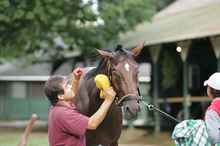During the summer months, horse owners some times notice problems with their horse's ears including areas of white plaque which can lead to an increase in head shaking caused by biting black flies that are attracted to the plaque and invade the sensitive areas of the horse's ears.

Dealing with ear plaque in your horse
If the horse becomes sensitive to the lesions in the ears, head shaking and head shyness may make it difficult to put on a halter or bridle.
© 2013 by Dennis Donohue
These plaques appear more visible when a horse's ears are clipped to make it more attractive for a competition or show. The plaques seem to be caused by a wart virus and can be spread by biting flies which make this an even larger issue, as they tend to aggravate the condition.
The white, plaque-like material can appear thick and crusty. In most cases, there is tender pink skin underneath the plaque. Although it is a benign condition that does not usually bother the horse, it can cause sensitivity. Once aural plaque develops, it is tough to get rid of permanently.
If the horse has become sensitive to the lesions, there may be head shaking, head shyness, and the horse may be come difficult to put a halter or bridle on.
These plaques are thought to be caused by a wart-causing virus, such as papillomavirus, and spread by biting flies.
There is no definitive treatment for these plaques. As they are mostly a cosmetic issue, if they are not bothering the horse, no treatment needs to be pursued.
However, if the horse has developed sensitive ears due to the plaques, certain treatments may be tried. The plaque can be removed and the pink skin underneath treated with a soothing, healing ointment. This usually reduces the size of the affected area and alleviates the pain.
Recent research showed that treatment with a topical cream of the drug Imiquimod can resolve ear plaques. The treatment does not work in all horses and does not resolve all cases, but in many cases either plaques are complete gone or diminished along with the ear sensitivity that can accompany them.
Anecdotally, a human immunomodulatory drug called Aldara can be applied as a cream to affected ears and has been reported to help.
For more difficult cases of aural plaque, horse owners may want to consider ear covers to wear outside to protect horses from the irritating sting of the black flies, which can aggravate aural plaque and worsen the pain.
